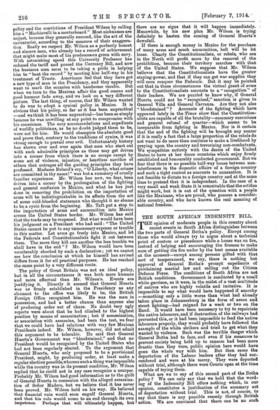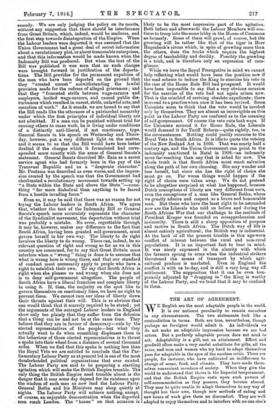THE SOUTH AFRICAN INDEMNITY BILL.
ITLHE opinion of moderate people in this country about 1 recent events in South Africa distinguishes between the two parts of General Botba's policy. Except among those who would always try to argue about a technical point of custom or precedence while a house was on fire, instead of helping and encouraging the firemen to make sure of getting the fire under by the best means available at the moment—except among persons gifted with that sort of temperament, we say, there is nothing but approval of General Botha's prompt expedients of proclaiming martial law and calling out the Citizen Defence Force. The conditions of South Africa are not British conditions. Government is conducted by a small white garrison, as it were, in the midst of a vast multitude of natives who are highly volatile and imitative. It is impossible to say what would have happened if anarchy —something only a little worse than what had already taken place in Johannesburg in the form of arson and street fighting—had reigned for a week or two on the Rand. It would have been necessary to try to repatriate the native labourers, and if destruction of the railways had prevented this, or it bad been impossible to feed the native labourers properly, they would probably have followed the example of the white strikers and tried to get what they wanted by violence. Such was the terrible danger which General Botha had to face, and even if his measures to prevent society being held up to ransom had been more drastic than they were, public opinion here would have gone the whole way with him. But then came the deportation of the Labour leaders after they had sur- rendered and were at his mercy. They were deported without trial, although there were Courts open at the time capable of trying them. What are we to say of this second part of the Botha policy ? We can only say that we hold that the word- ing of the Indemnity Bill offers nothing which, in our opinion, constitutes a justification of the summary act of deportation without trial. This is not, of course, to say that there is any possible remedy through British action. We are convinced that there can be no such remedy. We are only judging the policy on its merits, without any suggestion that there should be interference from Great Britain, which, indeed, would be madness, and the first step towards disintegration of the Empire. When the Labour leaders were deported it was assumed that the Union Government had a great deal of secret information about a revolutionary plot, or about treasonable enterprises, and that this information would be made known when the Indemnity Bill was produced. But when the text of the Bill was published it was seen that no such charges were brought forward in justification of the deporta- tion& The Bill provides for the permanent expulsion of the men who have been deported on the ground that they "created unrest " notwithstanding the lawful provision made for the redress of alleged grievances ; and that they " fomented strife between wage-earners and employers, incited wage-earners, and caused public dis- turbances which resulted in unrest, strife, unlawful acts, and cessation of work." As it stands, we are bound to say that the Bill reads like the utterance of a patriarchal monarchy under which the first principles of individual liberty are not admitted. If a man can be punished without trial for causing others to cease work, he is living under conditions of a distinctly anti-liberal, if not reactionary, type. General Smuts in his speech on Wednesday and Thurs- day, however, put a very different light on the matter, and it seems to us that the Bill would have been better drafted if the charges which it formulated bad corre- sponded more exactly with the sense of General Smuts's statement. General Smuts described Mr. Bain as a secret service agent who had formerly been in the pay of the Transvaal Republic and as a "desperate character." Mr. Pouts= was described as even worse, and the impres- sion created by the speech was that the Government had checkmated a revolutionary movement towards setting up "a State within the State and above the State "—some- thing "far more diabolical than anything to be feared from a hostile invading force."
Even so, it may be said that there was no reason for not trying the Labour leaders in South Africa. We agree that, whether the text of the Indemnity Bill or General Smuts's speech more accurately represents the character of the Syndicalist movement, the deportation without trial was probably a mistake. No error, regrettable through it may be, however, makes any difference to the fact that South Africa, having been granted self-government, must govern herself in her own way. The liberty to do right involves the liberty to do wrong. There can, indeed, be no relevant question of right and wrong so far as we in this country are concerned, for to say that Great Britain must interfere when a " wrong " thing is done is to assume that what is wrong here is wrong there, and that our standard of conduct must necessarily apply to people who have a right to establish their own. To say that South Africa is right when she pleases us and wrong when she does not is to deny self-government altogether. The people of South Africa have a liberal franchise and complete liberty in using it. If, then, the majority on the spot like to govern themselves on reactionary lines, we have no right to prevent them. We cannot ram our ideas of liberty down their throats against their will. This is so obvious that one would think that it scarcely required to be stated ; yet the arguments of the outraged Labour leaders in England show only too plainly that they suffer from the delusion that a thing can be and not he at the same time. They believe that they are in favour of democracy—rule by the elected representatives of the people—but what they actually want to do when something displeases them in the behaviour of those elected representatives is to thrust a spoke into their wheel from a distance of several thousand miles. When we find that this spoke is nothing less than the Royal Veto we are entitled to conclude that the Par- liamentary Labour Party as at present led is one of the most dunderheaded. political organizations that ever existed. The Labour Party are said to be preparing a startling agitation which will make the British Empire tremble. The only thing the British Empire need tremble about is the danger that it may some day depend for its existence upon the wisdom of such men as now lead the Labour Party. General Botha and his Ministers may sleep quietly at nights. The Labour Party will achieve nothing, except, of course, an enjoyable demonstration when the deported men reach London. The " beano " on that occasion is likely to be the most impressive part of the agitation. Both before and afterwards the Labour Members will con- tinue to troop into the same lobby in the House of Commons as formerly. Some of them will growl, of course, but the growling will be rather like that of the tiger in Herr Hagenbeck's circus which, in spite of growling more than the others, does the tricks which require the highest degree of teachability and docility. Possibly the growling is a trick, and is therefore only an expression of com- pliance.
While we have the Royal Prerogative in mind we cannot help reflecting what would have been the position now if the mad scheme to induce the King to exercise his veto in the case of the Home Rule Bill had prospered. It would have been impossible to say that a very obvious occasion for the exercise of the veto had not again arisen now. That is the mischief of reviving obsolete expedients ; there is no end to a practice when once it has been revived. Some Unionists seem to think that the veto would be invoked only by themselves. They are almost as incorrigible on this point as the Labour Party are confused as to the meaning of self-government. Of course the veto cuts both ways. If the Unionists secured it for Homo Rule, the Liberals would demand it for Tariff Reform—quite rightly, too, in the circumstances. Nothing could justify recourse to the Royal Veto in South Africa. It is idle to quote the vetoing of the New Zealand Act in 1866. That was nearly half a century ago, and the Union Government can point to the indemnity sanctioned in Natal in 1908—an indemnity more far-reaching than any that is asked for now. The whole truth is that South Africa must reach salvation along the path of her own choosing. She may wander and lose herself, but since she has the right of choice she must go on. Far worse things would happen if the right of choice were taken away. We do not pretend to be altogether surprised at what has happened, because Dutch conceptions of liberty are very different from ours, even the conceptions of a man like General Botha, whom we greatly admire and respect as a brave and honourable man. But those who have the least right to be astounded now are the Liberals who told us before and during the South African War that our challenge to the methods of President Kruger was founded on misapprehension and insincerity. There is still a sharp opposition of purpose and motive in South Africa. The Dutch way of life is almost entirely agricultural ; the British way is industrial. At the back of all the present trouble is this age-worn conflict of interest between the rural and non-rural populations. It is an important fact to bear in mind. It was nicely expressed in the alacrity with which the farmers sprang to arms when the industrial strikers threatened the means of transport by which agri- cultural produce is marketed. Even in England the conflict is with us to-day, and is still a very long way off settlement. The supposition that it can be even tem- porarily adjusted by "dragging ia " the King is worthy of the Labour Party, and we trust that it may be confined to them.











































 Previous page
Previous page